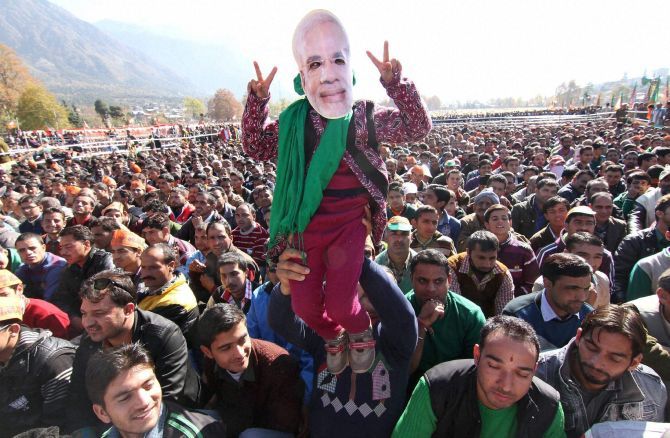'It marks the start of an era where the BJP must now campaign on its own record rather than against the misrule of another party,' says T V R Shenoy.
 Half-full? Half-empty?
Half-full? Half-empty?
How does one read the last set of elections of 2014?
The answer is that depends on depends on your perspective. Are you looking it from the viewpoint of the BJP, or that of a regional party?
Are you going to compare the current results to those of the last assembly polls, or to those of the 16th Lok Sabha polls?
Just about the only thing you can say for sure is that the polls continue to tell a tale of the decline of the Congress.
Lest one forget, the Congress was part of the Hemant Soren ministry that took office on July 13, 2013 (along with Lalu Prasad Yadav's Rashtriya Janata Dal). The Congress was also part of a coalition ministry headed by the National Conference's Omar Abdullah as of January 5, 2009.
But what does it say of the party that all of its coalition partners -- the Rashtriya Janata Dal, the Jharkhand Mukti Morcha, the National Conference -- chose to part ways with the Congress for the assembly elections?
You cannot really blame the regional parties. The difference in votes polled fighting alongside the Congress in parliamentary polls versus the share of votes fighting alone tells a vivid story.
In the Lok Sabha elections the Jharkhand Mukti Morcha polled 9.42% of the total votes in the state; fighting alone in the Vidhan Sabha elections the party got 20.4% and is the second largest party in the assembly. Neither the Rashtriya Janata Dal nor the Janata Dal-United could get a single MLA. elected.
In the parliamentary elections the National Conference got just 11.22% of the votes polled. In the assembly elections -- despite all the abuse that came Omar Abdullah's way after his disastrous handling of the floods in September -- the party won 20.8% of the votes.
The message has already been heard in the headquarters of all every party: The Congress is a liability to any group that becomes an ally.
How about India's ruling party? The BJP set a high bar for itself in the Lok Sabha polls -- and an even higher one when it spoke of 'Mission 44' in Jammu and Kashmir. It has certainly failed to reach those heights.
What is equally undeniable, however, that the BJP has more than doubled its previous strength in Jammu and Kashmir, and it has become the first party to win an absolute majority in Jharkhand for the first time since the state was created on November 15, 2000.
What were the issues at stake in the two states? Corruption and bad governance were definitely talking points in both (as they are in most of India). How about dynastic politics?
The BJP certainly raised that point in both states, implicitly attacking the Abdullah and Mufti clans in Jammu and Kashmir, and the Sorens in Jharkhand.
Did the voters buy this narrative? Not really, judging by the results.
He might have lost the chief minister's chair but Hemant Soren has ensured that the Jharkhand Mukti Morcha remains a significant presence in the state.
The Mufti family is all set to take over the reins in Srinagar, and even the Abdullah-led National Conference has done better than anticipated following the Lok Sabha elections.
The only dynasty to have fallen flat on its face is the Nehru-Gandhi clan, but we have already spoken of that.
By coincidence the election results were declared on the last day of the winter session of Parliament, a session where the Rajya Sabha had to be repeatedly adjourned due to disruptions over the issue of conversions. (Or 're-conversions'!) Has at least that debate been settled?
I fear not. Leaving aside the point that the Opposition can always find another reason to disrupt proceedings, people are already pontificating that the BJP's success in Jammu and its total washout in Kashmir was thanks to the consolidation of the Hindu vote in the former and the equal and opposite reaction in the latter.
Equally, some people are saying that the BJP was denied an even larger majority in Jharkhand because of missionary activists in the state. Both sides are going to draw precisely opposite messages from these results.
The farcical nature of the debate over 'secularism' becomes evident when you consider how easily an election can sway a party's stated position in Parliament. Where did 'secularism' go when Sharad Pawar's Nationalist Congress Party offered 'unconditional support' to the BJP after the Maharashtra polls? And where will 'secularism' be should the PDP reach out to the BJP to form a ministry in Jammu and Kashmir?
All you can say at the end of the day is that these elections mark both an end and a beginning. They mark the end of a campaign that the BJP started one year ago, the aim of creating a 'Congress-mukht Bharat'.
Whether through the BJP's canniness or through its own follies, the Congress has been reduced to a fringe player. But it also marks the start of an era where the BJP must now campaign on its own record rather than against the misrule of another party.
Jammu and Kashmir is, according to many judges, possibly the most blessed state of India above the ground thanks to its beauty.
Jharkhand is possibly the most blessed state of India under the surface, thanks to the wealth of mineral resources.
And they are also two of the most poorly governed states in India (in Jharkhand's case going back decades back when it was still a part of Bihar).
All one can hope is that both these states, as well as the rest of India alongside them, shall enjoy better government in 2015.
Happy New Year!
Image: BJP supporters at Prime Minister Narendra Modi's election rally in Kishtwar, Jammu and Kashmir. Photograph: PTI Photo
ALSO READ:










